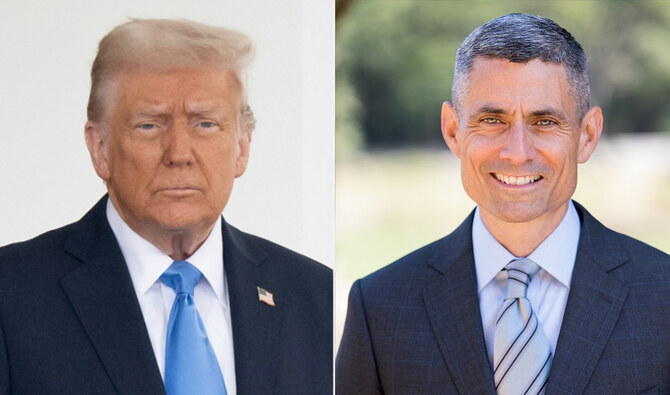KARACHI: President Donald Trump’s nomination of an Indian-origin security expert, Paul Kapur, as the United States (US) assistant secretary of state for South Asian affairs could bring “renewed challenges” for Pakistan, but there would be no significant shift in the already restrained US policy toward Islamabad, analysts said on Saturday.
Pakistan and the US collaborated during the Cold War and in the fight against Al-Qaeda after 9/11, yet their relationship was also tested by divergent priorities on various issues. In recent years, Washington and Islamabad’s ties deteriorated as the former suspected the latter of supporting the Taliban in their 2021 takeover of Kabul, allegations which Islamabad rejected. Tensions rose further in 2022 when former Pakistan premier Imran Khan accused the Joe Biden administration of orchestrating his ouster via a parliamentary vote, a charge the US denied.
Kapur, who will succeed Donald Lu upon Senate confirmation, has long advocated for a closer US-India partnership and has been critical of Pakistan’s security policies. His appointment reflects a broader bipartisan consensus in Washington on prioritizing India as a key strategic partner, particularly in the Indo-Pacific.
Political analysts and foreign policy experts believe that while Kapur’s nomination underscores continuity in Washington’s South Asia approach, its policy positions suggest a “tougher stance toward Pakistan.”
“There is a growing bipartisan consensus in Washington on strengthening the US-India strategic partnership. Several Trump appointees, including Kapur, are advocates of a deeper relationship between both countries,” said Syed Hassan Akbar, a senior foreign policy specialist.
“How this reflects in policy will shape US-Pakistan relations going forward. But given the realities of our region we should not expect any significant departure in US policy toward Islamabad, which has been restrained ever since the US withdrawal from Afghanistan.”
Kapur is President Trump’s third top pick among Indian-origin Americans after Tulsi Gabbard and Kash Patel, who both have already been cleared by the US Senate as director of National Intelligence and head of the Federal Bureau of Investigation (FBI).
Akbar pointed out that Kapur has previously argued against US security assistance to Pakistan, saying that it would be perceived negatively in New Delhi and instead calling for a continued dialogue and limited economic engagement between Washington and Islamabad.
Abdul Basit, a former Pakistani high commissioner to India, echoed the concerns and said that Kapur’s appointment would likely increase pressure on Pakistan at an operational level even as the broader strategic dynamics remain unchanged.
“This is a strategic decision by the United States, and both Democrats and Republicans are committed to strengthening their partnership with India,” Basit said.
“But operationally, we will feel the impact.”
Pakistan’s diplomatic position remains weak due to a lack of economic leverage and a struggling diaspora engagement, according to Basit.
“Pakistan is not viewed as strategically significant, except in negative contexts such as terrorism, nuclear proliferation, and Afghanistan,” he said.
“Our embassy faces limitations and unless we mobilize Pakistani-Americans effectively, improving our diplomatic presence will be difficult.”
He stressed the importance of political stability in Pakistan, arguing that “unpredictability weakens foreign policy.”
“Political stability is crucial, predictability and consistency are key. Without it, the country will not be strong internally, and foreign policy will suffer as all these factors are interconnected,” the former diplomat said.
While Islamabad has exercised caution in commenting on Trump’s seemingly anti-Pakistan appointments, Syed Zulfikar Abbas Bukhari, a key figure in the Pakistan Tehreek-e-Insaf (PTI) opposition party, called Kapur’s nomination an “internal” US bureaucratic matter.
He, however, welcomed the departure of Donald Lu, whom PTI founder and former Pakistan prime minister Imran Khan had accused of orchestrating his removal from power via a parliamentary no-trust vote in 2022.
“This is the US’s internal matter of bureaucratic changes. It’s a welcome change as whatever Mr. Donald Lu touched, he destroyed. A lot of the unrest in the subcontinent is due to him,” Bukhari added.
Christopher Clary, an associate professor of political science at the US University at Albany, highlighted Kapur’s longstanding academic focus on Pakistan, noting that Trump’s South Asia envoy pick had portrayed Pakistan as a “uniquely dangerous state” due to its strategic choices.
“Kapur likely will be more skeptical of Pakistan than any previous incumbent of that office,” Clary wrote on X. “He has been involved for many years in exploring opportunities for US-India cooperation, but his academic work has had a greater Pakistan emphasis.”
With Kapur in the key position, analysts expect the US to continue its policy of limited engagement with Pakistan, while focusing on strategic alignment with India.
Akbar suggested Pakistan to prioritize its economic growth and regional stability to navigate the evolving geopolitical landscape.
“Pakistan’s focus should be on improving its economy and addressing challenges in our immediate neighborhood while ensuring that, at a minimum, crisis management mechanisms continue to operate with Washington,” he said.
Basit, meanwhile, said Pakistan must make proactive efforts to strengthen its diplomatic position.
“Unless we take serious steps to bring political stability at home and mobilize our diaspora in the US, we will have to face challenges in ties with America,” he said.
US President Trump’s South Asia envoy pick signals ‘renewed challenges’ for Pakistan — analysts
https://arab.news/g7g2y
US President Trump’s South Asia envoy pick signals ‘renewed challenges’ for Pakistan — analysts

- Paul Kapur, Trump nominee for assistant secretary of state for South Asia, has been a vocal critic of Pakistan’s policies
- While Islamabad has not commented on the nomination, member of jailed ex-PM Imran Khan’s party calls it ‘welcome change’
Afghanistan urges voluntary return of refugees as Pakistan resumes deportations

- Last month, Pakistan set a March 31 deadline for Afghan Citizen Card holders to return to their country on their own
- Afghan officials in Kabul seek humane treatment for refugees, saying even people with valid documents felt uncertainty
ISLAMABAD: The Taliban interim administration in Kabul on Tuesday urged Afghan refugees to return home voluntarily, as Pakistan resumed deportations following a March 31 deadline issued last month for undocumented migrants and Afghan Citizen Card (ACC) holders to leave the country.
Pakistan’s decision has coincided with the Eid Al-Fitr celebrations, casting a shadow over the religious holiday for thousands of Afghan families. The move is part of a broader repatriation drive launched in 2023, which has so far seen more than 800,000 Afghans expelled.
Pakistani authorities maintain Afghan nationals have been involved in militant attacks and organized crime, accusations Kabul denies.
The crackdown began amid a surge in violence by armed groups like the Tehreek-e-Taliban Pakistan (TTP) and the Baloch Liberation Army (BLA), whose leaders Islamabad claims are based in Afghanistan, a charge rejected by the Taliban administration.
“The Islamic Emirate has reiterated its call for the voluntary return of Afghan migrants as the celebration of Eid Al-Fitr already began,” Afghanistan’s state-run Bakhtar news agency reported on Tuesday. “This appeal comes in light of increasing deportations of Afghan refugees from neighboring countries, mainly Iran and Pakistan.”
“Mawlavi Abdul Kabir, the country’s Minister of Refugees and Repatriation, has urged neighboring countries to halt these deportations and allow Afghans to return home voluntarily,” it added. “He emphasized the importance of humane treatment for refugees, especially in light of reports of mistreatment of Afghans by border nations, including instances where individuals holding legal visas were also deported.”
The agency said Pakistan’s “renewed crackdown” had left even documented Afghan refugees uncertain about their future.
Last week, Afghan refugee leaders in Karachi held a press conference appealing to Pakistani authorities to reconsider the timing of the deportations.
“Pakistan has generously hosted us for nearly 47 years, and a large portion of these refugees were born in Pakistan,” said Hajji Abdullah Shah Bukhari, chairman of the refugee community in Sindh. “Even if the government decides to expel us, it should not be done during Eid.”
He rejected claims that Afghan refugees were involved in militancy, saying, “We ourselves are victims of war and terrorism.”
International rights groups have also urged Islamabad to halt the deportations, warning that some returning Afghans could face threats under Taliban rule.
Pakistan insists it is carrying out the deportation campaign in a humane manner, saying it respects the dignity of all Afghan nationals.
However, officials maintain that the country has hosted Afghan refugees for decades and it is now time for them to return.
Roast chicken made in ‘secret’ 12-spice marinade is Eid hit in northwestern Pakistan

- Customers have been showing up from far and wide to buy Degi Chargha from Rafi Ullah Safi’s shop in Qissa Khwani Bazaar
- Safi’s father concocted the recipe 50 years ago and since then, the marinade has become a local hit, with orders increasing for Eid
PESHAWAR: In the days leading up to the Eid Al-Fitr holiday, Rafi Ullah Safi is especially busy at his shop in Peshawar city’s historic Qissa Khwani Bazaar as customers arrive from across the Khyber Pakhtunkhwa province and beyond to order his Degi Chargha: a steamed chicken roast prepared in a secret marinade of 21 spices.
Safi’s father concocted the recipe over five decades ago and since then, the marination has become the stuff of legend, with orders spiking ahead of Eid and over the three days of the holiday as people buy the roast to serve at home or present as a gift to relatives and friends.
“The night before Eid day, we sit here till morning. There is a rush in the bazaar, people buy dresses and shoes, and some buy sweets and chicken,” Safi told Arab News as he packed an order for a customer.
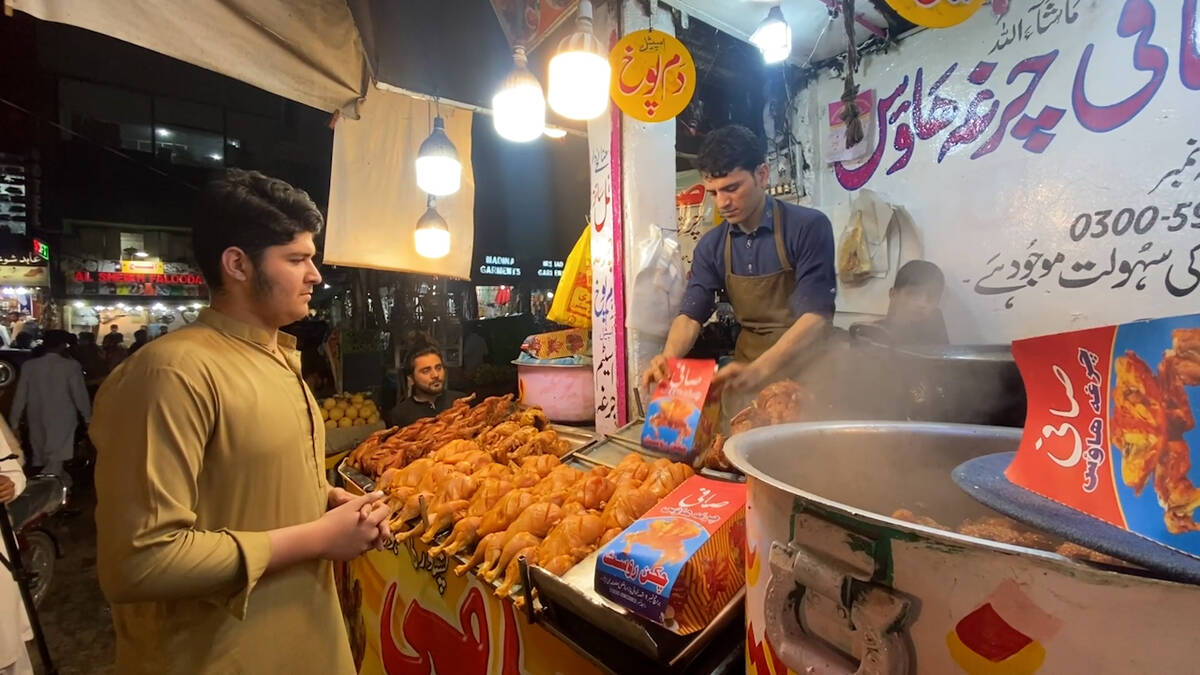
“We offer the morning prayer here [in Qissa Khwani Bazaar] and then go home. Then we offer the Eid congregation [the next morning] and people start calling us soon after to come to the shop to serve them Degi Chargha even on Eid day.”
Despite the roast’s popularity, the exact spices that go into the mix are only known to the family.
“All the ingredients are kept secret,” Safi said. “My father started the business and my elder brothers handled it when I was young. Then I joined in, and now my children are also working here.”
He said the recipe, passed down from his father to elder brothers and now him, was being learnt by his children.
“First, we take yoghurt and blend it properly, after which we put the 21 spices mix, ketchup, lemon and other things,” Safi said. “We also add some of the spices bought from the bazaar, which make our special mixture of spices stronger and sourer.”
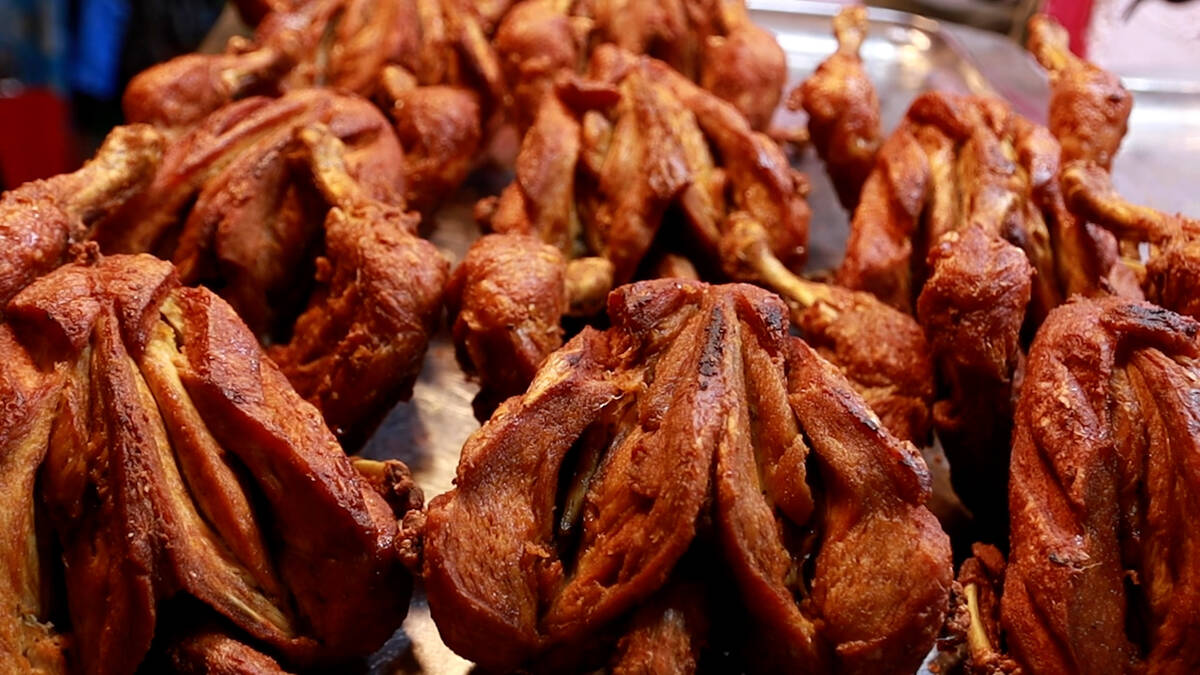
The spices are mixed in the yogurt with an electric churner for almost half an hour until the color changes to red, Safi explained. The mixture is prepared at his home early every morning before being brought to the shop.
The chicken meanwhile is deep fried in oil and then cooled for 30 minutes before being soaked in the spice and yogurt marinade.
“The chicken is dipped in the special spices and then placed in the steam pot, which is placed over boiling water for 20-30 minutes. Then the Degi Chargha is ready,” said Safi.
One full chicken retails for around $5 a piece.
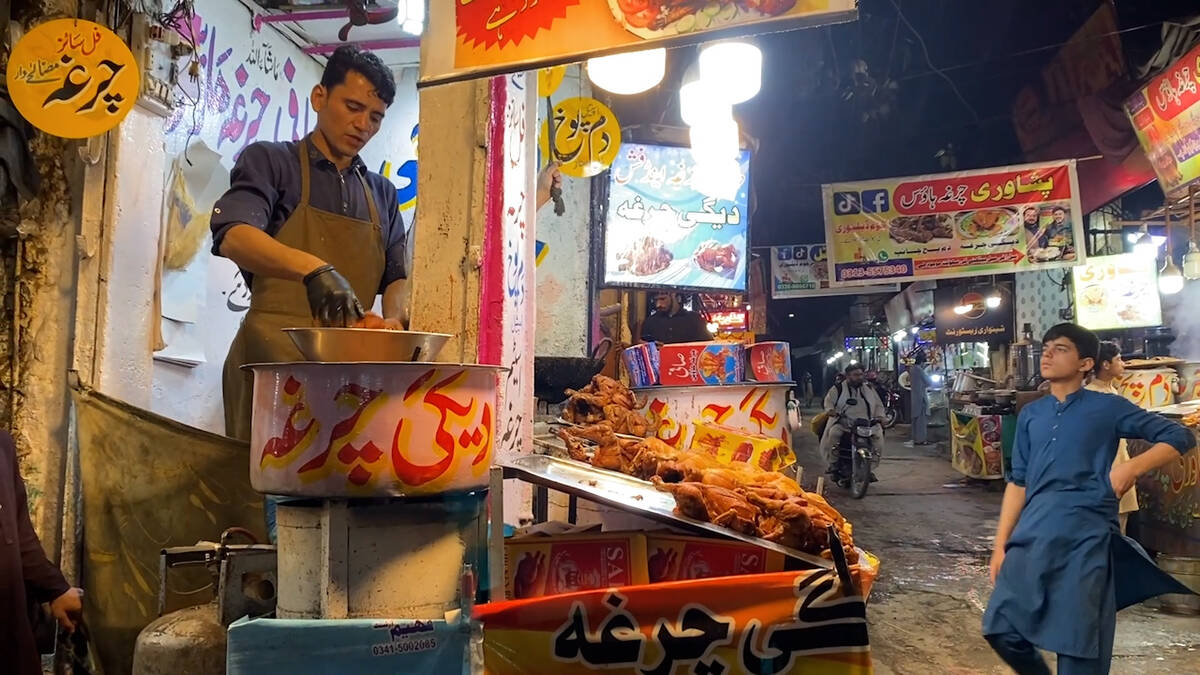
“The price is higher than usual roasts because of the specialty and uniqueness of the chicken,” Safi said.
Hammad Khan, a 22-year-old customer, said social media viral videos had increased the popularity of the Degi Chargha.
“Many food vloggers have made videos motivating others to come and taste it. That’s why I have come here to buy and check the taste of this chicken,” he said.
Another customer Hamza Khan, a resident of Peshawar’s Saddar Bazaar, also said he had discovered Degi Chargha through TikTok.
“I saw a video of this shop so we thought to go and give it a try,” he said. “The specialty was the spices added to the chicken. It enhances the taste. My experience was good.”
Faith in every shell: Karachi’s Hindu artisan honors Islamic art through seashell creations

- Babu Lal, 64, picks seashells and inscribes them with sacred Islamic names and verses
- Nearly 300 Hindu families in Karachi have kept seashell art tradition alive since before 1947
KARACHI: In a modest home situated in one of the narrow streets of a portside slum in the Pakistani megacity of Karachi, a 64-year-old artisan gently picked up a seashell, wiped it clean and began to inscribe it in ink with the names of Allah and the Prophet Muhammad (peace be upon him).
With careful strokes, he transformed the shell into a delicate showpiece, destined for display in upscale shops in Clifton and, eventually, homes across Pakistan. The piece is special, and so is the maker: Babu Lal, a Hindu by faith.
Hindus make up 2.14 percent of Pakistan’s population, according to the 2017 census, with a majority of them living in the southern Sindh province, of which Karachi is the capital. In many areas of Sindh, Hindus and Muslims have historically coexisted, though reports of discrimination and violence, such as forced conversions of Hindu girls, blasphemy accusations and land grabs, have increased in recent decades, drawing concern from human rights groups.
And yet, in Karachi’s coastal area of Ibrahim Haideri — along with parts of the Qur'angi and Clifton neighborhoods — nearly 300 Hindu families have kept this seashell art tradition alive, passing it down through generations since well before the country’s independence in 1947.
“Our art teaches respect for all religions, and we work for all religions,” Lal told Arab News, his weathered hands working on a shell.
“We first bring shells from the sea, then clean and wash them, and after that, we make art products from them and supply them to the market,” he said. “All the hard work and labor in this process is done by hand. There is no machine work involved.”
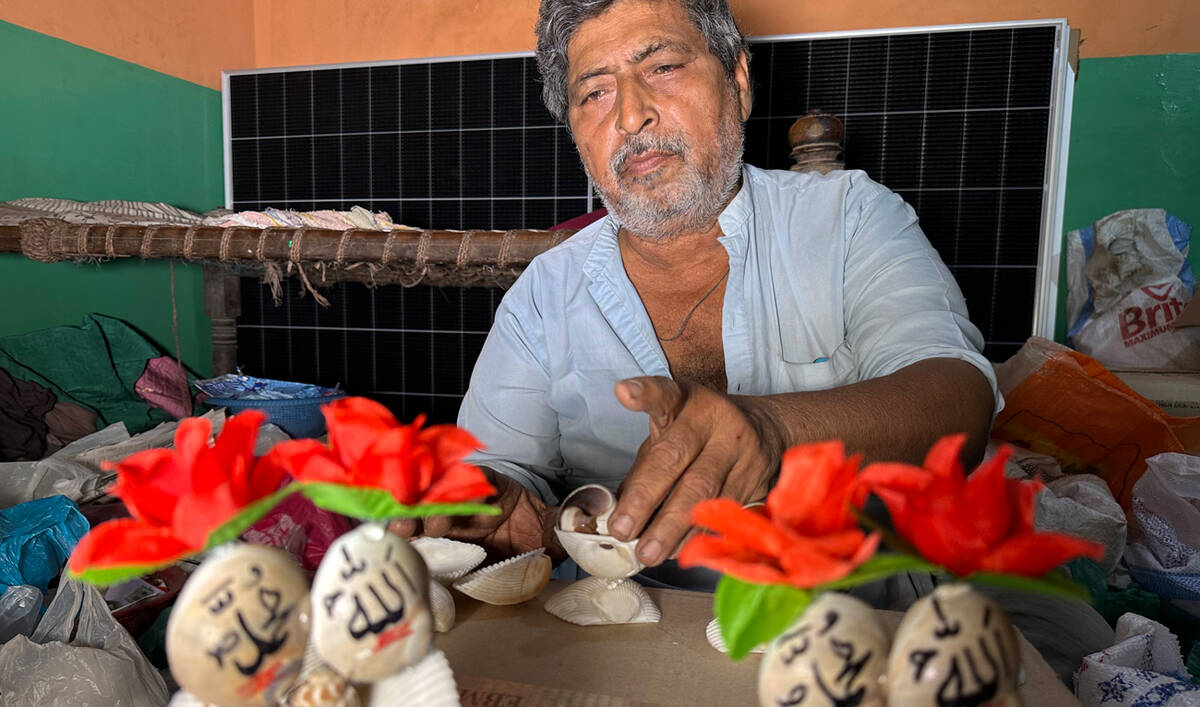
Lal’s creations include a wide range of items from keychains and glass ornaments to frames bearing sacred names and miniature replicas of the Holy Kaaba, among the most sought-after items in the market.
“While making these items, we take extra care in cleaning and handling them,” he said. “We do all this work quite carefully.”
UNCERTAIN FUTURE
Lal’s journey as an artisan began in childhood when he learned the trade by watching his father and grandfather at work over half a century ago.
But the future of the craft is now uncertain, due to a lack of institutional support and limited opportunities for artisans like himself. This has discouraged him from passing the craft on to his children.
Another problem, according to Lal, was that stalls set up by local artisans were now frequently dismantled and once busy sales spots for artists, including popular areas along the Clifton seafront and Manora, had been closed off in recent years.
“They no longer allow us to set up stalls there so what can we do?” the artist asked. “That’s why we want to stop this work. If you’ve seen the stalls at Clifton’s Sea View, those have also been shut down.”
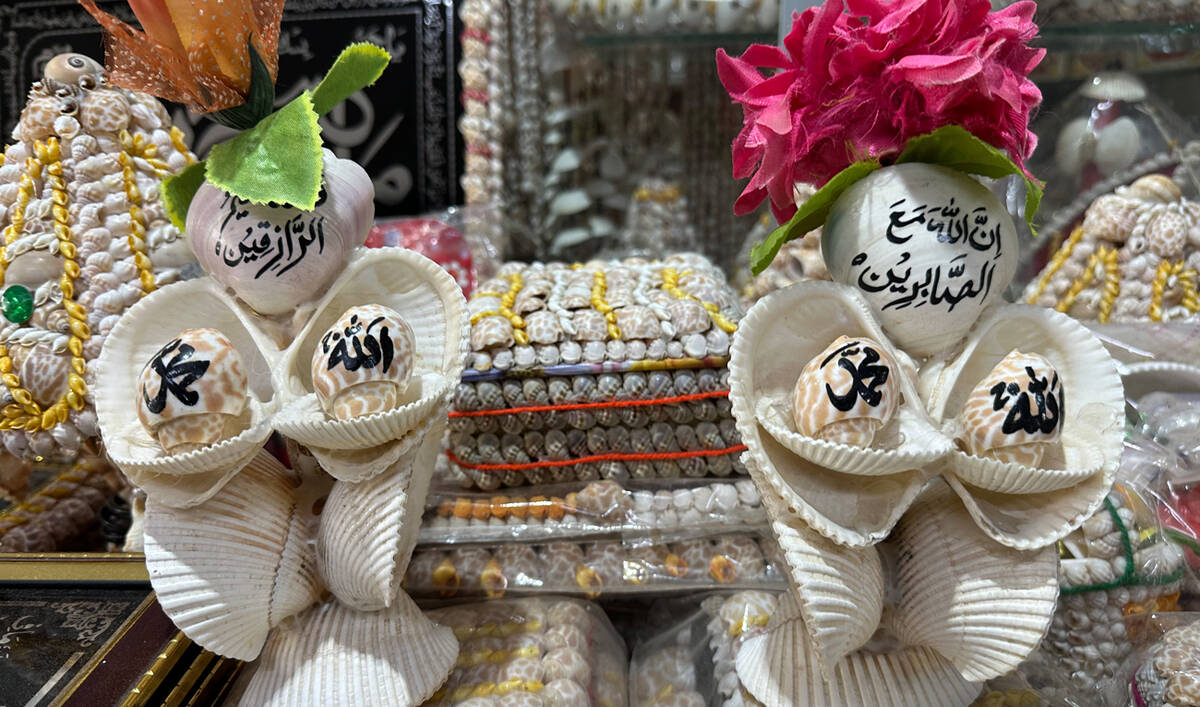
Despite these challenges, shopkeepers like Gul Sher Abbasi acknowledge Lal’s dedication and craftsmanship.
“These items mostly come from Babu,” Abbasi told Arab News. “Then, there are different people who manufacture and we get them as well.”
“Handcrafted items are something different,” he added. “The things that are made by hand are special. There is a different pleasure in preparing those things.”
Abbasi said the seashells’ craft held potential beyond Pakistan’s borders and with the right support, Lal’s handmade items could find buyers in Gulf countries like Saudi Arabia, the United Arab Emirates and Qatar.
Meanwhile, Lal said his art extended across religious lines, with orders coming in for Christian, Hindu and Muslim communities alike.
“We work for everyone, and we also make things based on specific orders,” he said. “If someone orders us to make an idol, we make it. If someone orders a cross, we make it.”
Pakistan PM extends greetings to UAE and Iranian leaders on Eid Al-Fitr

- Shehbaz Sharif acknowledges UAE’s longstanding support to Pakistan, seek stronger economic ties
- The prime minister also calls for closer cooperation with Iran to deal with border security challenges
ISLAMABAD: Prime Minister Shehbaz Sharif reached out to the leaders of the United Arab Emirates and Iran to extend Eid Al-Fitr greetings on Monday, highlighting Pakistan’s close ties with the two countries and calling for continued collaboration in areas of mutual interest.
Sharif has contacted the top leadership of several Muslim-majority nations since the end of Ramadan, including Gulf states, Malaysia and Bangladesh, in a diplomatic outreach that coincides with Pakistan’s efforts to attract foreign investment to bolster its struggling economy.
According to the Prime Minister’s Office, Sharif held “a warm and cordial telephone conversation” with UAE President Sheikh Mohamed bin Zayed Al Nahyan.
“The Prime Minister fondly recalled his recent meeting with the UAE President in Abu Dhabi last month and reaffirmed his strong resolve to transform the existing Pakistan-U.A.E. ties into a mutually beneficial economic partnership,” his office said in a statement. “He also expressed Pakistan’s deep appreciation for U.A.E.’s longstanding and steadfast support to Pakistan.”
The UAE president reciprocated the Eid greetings and reiterated his country’s “unwavering support for Pakistan’s economic and development initiatives,” while stressing the importance of continued collaboration across various fields.
Sharif also spoke with Iranian President Masoud Pezeshkian and extended Eid greetings to Iran’s Supreme Leader Ali Khamenei and its people.
“The Prime Minister said that Pakistan and Iran enjoyed deep fraternal relations and, as neighboring countries, they could benefit from enhanced trade,” a separate statement said. “At the same time, they also needed to cooperate more closely to deal with challenges such as border security.”
The Pakistan-Iran border has long been a source of concern, with both sides grappling with smuggling networks, cross-border militant activity and recent flare-ups in tensions involving missile and drone attacks last year.
Pakistan saw highest number of militant attacks during Ramadan in a decade

- The Pak Institute for Peace Studies reported at least 84 attacks during Ramadan, which ended Sunday in Pakistan
- Some militant groups previously paused hostilities for Ramadan, but overall violence has increased in recent years
ISLAMABAD: Pakistan saw the highest number of militant attacks during the Muslim holy month of Ramadan in a decade, a think tank reported Monday.
Some militant groups previously paused hostilities for Ramadan, but the country has seen an overall increase in violence in recent years.
The Pak Institute for Peace Studies reported at least 84 attacks during Ramadan, which ended Sunday in Pakistan. It reported 26 attacks during last year’s Ramadan.
The Pakistani Taliban unilaterally ended a ceasefire with the government in November 2022, while the Baloch Liberation Army has developed its capabilities to stage elaborate attacks. Both have contributed to the rise in violence.
The outlawed BLA was behind a train hijacking on March 11 in the southwest province of Balochistan that killed at least 25 people.
Another think tank, the Pakistan Institute for Conflict and Security Studies, recorded 61 attacks in the first three weeks of Ramadan. There were 60 total attacks in the previous Ramadan, it said.
It also said this was the deadliest Ramadan in a decade for security personnel, with 56 killed between March 2 and March 20.
Abdullah Khan, managing director of the Pakistan Institute for Conflict and Security Studies, cited an overall escalation in militant activity.
“There has been a unification of different groups,” Khan said. “Baloch factions are joining hands. In some areas (of the northwest), the Hafiz Gul Bahadur faction is more lethal than the Pakistani Taliban, it is competing with them.”
He said there was also a revival of banned organizations like Lashkar-e-Islam, which operates from the northwest province of Khyber Pakhtunkhwa.
Pakistan accuses the Taliban government in neighboring Afghanistan of giving haven to such groups, saying militants have thrived since the Taliban returned to power in 2021. Kabul rejects that.
Khan also pointed to intelligence failures, including those that led to the train hijack in Balochistan, and the widening trust gap between the state and the population: “It’s important to get back public support. The public is the first line of defense.”


